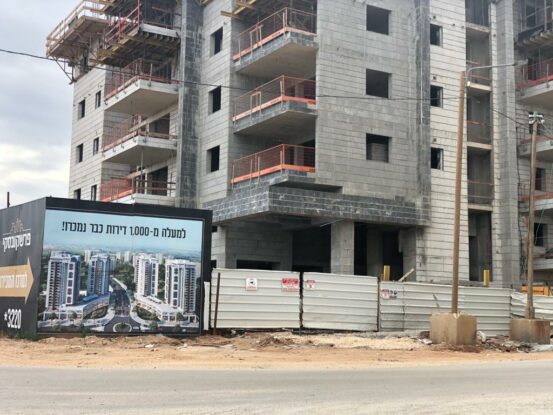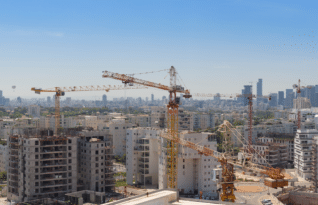With a monthly price increase of 2% and an annual increase of over 16%, Israel’s real estate market continues to break records. Prices are soaring, despite the fact that the number of total transactions has gradually decreased since December 2021. Since then, the number of investment purchases has dropped by 33%.
According to the Housing Price Index published by the Central Bureau of Statistics (CBS) on Sunday, home prices in Israel continue to break records, having risen by 16.3% in the past year. According to the data, from February to March 2022, there was a monthly increase of 1.9% in housing prices. Paradoxically, these figures were published shortly after it was released that for the first time in a long time, there was a slight decrease in the number of real estate transactions. However, it seems that this decrease has not yet curbed the rise in prices.
Home prices continue to rise by more than 20%
Israel real estate prices are skyrocketing throughout the country, with the sharpest increase recorded in the Central District (18.5%), followed by the Jerusalem District (16.7%), Tel Aviv (16.0%), Haifa (14.9%), the North (13.8%), and the South ( 12.3%). According to the Housing Price Index, the prices for new homes have seen an even sharper increase than the rest of the market, with an annual price jump of 20.7%. The report reveals that the average price of apartment purchase transactions was NIS 1.757 million in the first quarter of 2022, compared to NIS 1.767 million in the last quarter of 2021. This means that despite the fact that home prices are continuing to rise, on average, Israelis actually bought cheaper apartments in the first quarter of the year than at the end of last year.
After more than three years of a steady increase in the volume of sales, numbers are dropping
Shortly before the Housing Price Index was put out, CBS published data indicating that the market was actually beginning to calm down, based on statistics that show a significant drop in the volume of sales of new properties. According to the data, 13,890 new properties were sold in the first quarter of 2022, a decrease of 12.4% compared to the 15,860 properties sold in the fourth quarter of 2021. When compared to the 14,250 properties sold in the first quarter of 2021, there was a decrease of approximately 9% in the volume of sales. From November 2021 to March 2022, there was an average monthly decrease of 1.9% in the number of properties sold, compared to a monthly increase of 2.4% that lasted for three and a half years, from March 2018 to October 2021. This indicates a significant change in the market.
The city where the highest number of new apartments were sold in the first quarter of 2022 was Tel Aviv-Yafo, with 961 apartments sold, reflecting a decrease of 13.6% from the previous quarter. Next in line was Rishon Lezion, where 812 new apartments were sold, an 80% increase in sales. Jerusalem is third, with 739 new apartments sold (a drop of 8%), followed by Ashkelon (719 apartments, 16% decrease), and Bet Shemesh (709 apartments, 114% increase). Mevaseret Zion is the only municipality that had an even greater increase in apartment sales than Beit Shemesh, with 336 apartments sold, indicating an increase of 222% from the previous quarter.
The increase in purchase tax for investment properties led to a drop in transactions
At the same time, the Ministry of Finance also published data that indicates a slight calming in the market. In March 2022, 11,300 new and second-hand apartments were purchased in the free market, a decrease of 2% compared to the corresponding month last year. When looking at monthly averages since the purchase tax for investment properties was increased, 10, 400 apartments were purchased on the free market from December 2021 to March 2022. This is a decrease of 3% compared to the same period last year. The number of new properties sold in this four-month period decreased by 7% compared to the corresponding period last year.
Naturally, the real estate investment sector saw the most significant drop in the volume of purchases. In the first four months after the purchase tax was raised, investors purchased a total of 2,600 thousand apartments, 33% less than the corresponding months of the previous year.
So why are home prices continuing to rise despite a decline in the number of transactions? Firstly, it is important to understand that the decrease in sales transactions is relative to the record amount of transactions that occurred in October-November when investors bought a huge number of apartments before the purchase tax increase, but in relation to the norm, it is still a very high volume, i.e the level of demand remains high.
Second, even if there is a more significant decrease in the number of transactions in the coming months, there is no guarantee that this will be reflected in a decrease in prices or even in the stabilization of prices. If there is one thing that the Israeli housing market proves, again and again, it is that price increases occur with much greater ease than declines. Even in the years of sharp slowdown during the time of the former finance minister Kahlon, with a very limited number of transactions, the sellers of apartments and developers managed to hold their breath and hardly lower prices. This is likely to happen in the months ahead, as a slowdown in the industry is anticipated.







